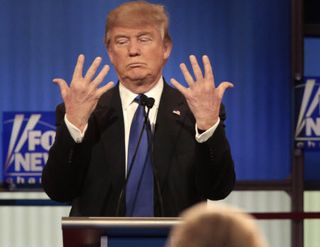Taking Candidate Trump Statements, Projecting 'President Trump' Policies

Donald Trump for months has been viewed inside the Beltway as engaging political theater, a party “renegade” and a gift to pundits on both sides of the aisle.
But after his Super Tuesday delegate haul — not a sweep, but a strong showing that solidifies his front-runner status — “President Trump” is no longer a laugh line.
Well, almost.
A Washington-based telecommunications lawyer, no fan of the candidate, was still taking the suggestion with a healthy dose of arch humor last week in responding to a request for input on what the telecom policy bent of a Trump administration would be.
Actual Trump Statement: “We’re going to build a great wall on the border with Mexico and the Mexicans will pay for it!”
Translation to Telecommunications Policy: Disband the FCC’s International Bureau and require any licensee with even 1% foreign ownership to leave the country (that means you, Sprint and T-Mobile).
Actual Trump Statement: “We have to stop all Muslims from entering the U.S. until we can figure out what the hell is going on!”
Multichannel Newsletter
The smarter way to stay on top of the multichannel video marketplace. Sign up below.
Translation to Telecommunications Policy: Block all Internet traffic originating from Turkey, Indonesia, Egypt, and every other majority Muslim country.
Actual Trump Statement: “I had a lousy earpiece.”
Translation to Telecommunications Policy: Ban NPR.
A President Trump, arguably the first thin-skinned elephant in captivity, might want to ban the media in general. He has called them “horrible” people and said as president he would try to make it easier to apply libel laws to penalize journalistic “hit” pieces.
Despite his media antipathy though, he remains a TV hit: Early Nielsen numbers showed that March 3’s Republican debate on Fox News Channel tallied 16.9 million viewers, making it the highest-rated debate of 2016 and the second-highest-rated telecast in Fox News’s almost 20-year history.
— John Eggerton
Azteca America Brings Its Upfront to Buyers
Last May, executives at Azteca America, like their counterparts at other U.S. Hispanic networks, held an upfront event in New York where they talked up programming plans and partied with ad buyers. Some of the net’s executives even performed in a “Chicago”-style number at the event.
This year, the network, owned by Mexican broadcaster TV Azteca, is ditching the song-and-dance routine for four smaller meetings and parties with clients in Los Angeles, Chicago, Dallas and … New York.
“Rather than waiting for all the clients to come to this hectic week in New York, we decided to take the upfront to them beforehand,” CEO Manuel Abud told The Wire.
But don’t media buyers expect a big production and enjoy the bustle of Hispanic Upfront Week in New York? “Honestly I’m not sure that’s the case,” he said. “If you look at the schedule, there’s a lot of people trying to do that, and we think it’s going to be better for the businesses to take the upfront to them. I guess we’ll see.”
Thus far, he said, buyers seem to like the approach — two days of client meetings with a party at the end, on a smaller scale than last year’s Best Buy Theatre production.
How did last year’s upfront sales do? “OK, not as great as I wanted us to do but we had decent growth,” Abud said — another reason to change things up a bit.
By the time the week of May 16 rolls around, and Univision and MundoMax (who’ve already announced plans) and others are doing their upfronts in New York, Abud and company will have wrapped their gatherings in Los Angeles (March 30), Chicago (April 5), New York (April 13) and Dallas (April 21).
Abud, who joined as CEO in May 2014, said the Azteca America pitch revolves around Mexican soccer and a primetime schedule of a game show at 7 p.m., a reality show at 8, a newsmagazine at 9 and an action series at 10. “It’s working. It’s a good combination, it’s a good alternative.”
— Kent Gibbons
Contributing editor John Eggerton has been an editor and/or writer on media regulation, legislation and policy for over four decades, including covering the FCC, FTC, Congress, the major media trade associations, and the federal courts. In addition to Multichannel News and Broadcasting + Cable, his work has appeared in Radio World, TV Technology, TV Fax, This Week in Consumer Electronics, Variety and the Encyclopedia Britannica.

